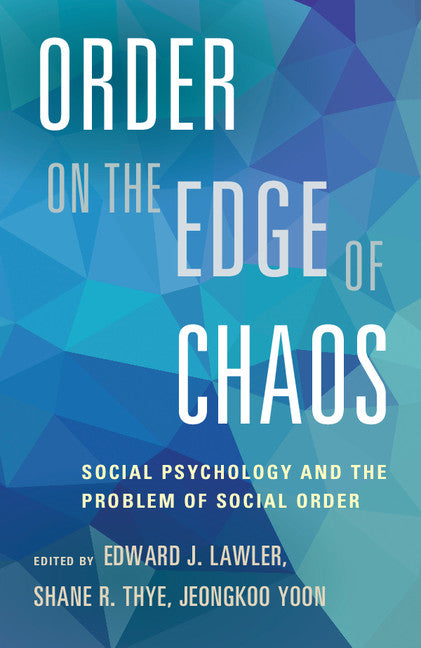Freshly Printed - allow 8 days lead
Couldn't load pickup availability
Order on the Edge of Chaos
Social Psychology and the Problem of Social Order
Order on the Edge of Chaos answers the question: how do people today create and sustain order in their lives and in their groups?
Edward J. Lawler (Edited by), Shane R. Thye (Edited by), Jeongkoo Yoon (Edited by)
9781107076754, Cambridge University Press
Hardback, published 9 December 2015
346 pages, 11 b/w illus. 2 tables
23.8 x 15.3 x 2.4 cm, 0.59 kg
'… the compilation offers a wide range of alternative and sometimes complementary frameworks, concepts, and processes for guiding scholars in explorations of the links that bond the individual to the social.' Choice
Order and stability are tenuous and fragile. People have to work to create and sustain a semblance of stability and order in their lives and in their organizations and larger communities. Order on the Edge of Chaos compares different ideas about how we coordinate and cooperate. The ideas come from 'micro-sociology', and they offer new answers to the classic question of Thomas Hobbes: 'how is social order possible?' The most common answers in sociology, political science, and economics assume a fundamental tension between individual and group interests. This volume reveals that social orders are problematic even without such tension, because when people interact with each other, they verify their identities, feel and respond to emotions, combine different goal frames, and develop shared responsibility. The ties of people to groups result from many aspects of their social interactions, and these cannot be explained by individual self-interest.
1. The social psychology of social order: an introduction Edward J. Lawler, Shane R. Thye and Jeongkoo Yoon
2. The evolutionary biology and the sociology of social order Jonathan Turner
3. Social rationality and weak solidarity: a co-evolutionary approach to social order Siegwart Lindenberg
4. An integrative theory of action: the model of frame selection Hartmut Esser and Clemens Kroneberg
5. The center cannot hold: networks, echo chambers, and polarization Daniel J. DellaPosta and Michael W. Macy
6. Social exchange and social order: an affect theory approach Edward J. Lawler, Shane R. Thye and Jeongkoo Yoon
7. Institutions, trust, and social order Karen S. Cook
8. Identity verification and the social order Peter J. Burke and Jan E. Stets
9. Identities, roles, and social institutions: an affect control account of social order David R. Heise, Neil J. MacKinnon and Wolfgang Scholl
10. The gender frame and social order Cecilia L. Ridgeway
11. Status, power, and social order Theodore Kemper
12. Interaction order: the making of social facts Anne Warfield Rawls
13. The arts of together: social coordination as dyadic achievement Hannah Wohl and Gary Alan Fine
14. Dignity as moral motivation: the problem of social order writ small Steven Hitlin and Matthew Andersson
15. The legitimacy of groups and the mobilization of resources Morris Zelditch
16. Social order from the bottom up? Peter V. Marsden.
Subject Areas: Behavioural economics [KCK], Social, group or collective psychology [JMH], Social theory [JHBA], Sociology & anthropology [JH]


